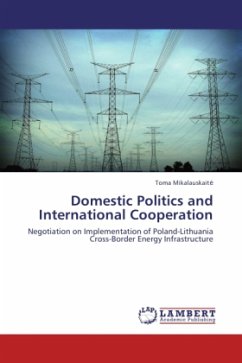The goal of this study is to highlight the impact of domestic politics on the bargaining process regarding the implementation of cross-border energy infrastructure projects. Adopting Putnam s two-level game model, this research examines the possibilities of altering the outcome of negotiations. Three hypotheses are derived from the theoretical framework on the validity of strategies employed by the political leaders. The results show that synergistic issue linkage is a fruitful strategy, while the issuing of threats must be backed by a stable domestic stance. The right of veto to initiate the negotiation is effective as well, but only at the initial stages of cooperation.
Bitte wählen Sie Ihr Anliegen aus.
Rechnungen
Retourenschein anfordern
Bestellstatus
Storno








